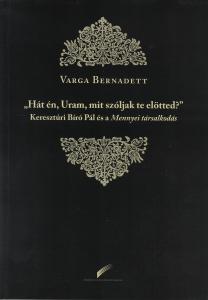
“And What Could I Say Before Thee My Lord” ”
“And What Could I Say Before Thee My Lord” Pál Keresztúri Bíró and the Heavenly Conversation
Written by Bernadett Varga
NSZL, Budapest, 2017., 212 pages
ISBN 978 963 200 677 2
During the past decades, both in Hungarian and international research there has been growing interest in the “practical” and emotional literature of the Early Modern Period, including sermons, catechisms, community and private songs, meditations, books of comfort and counseling. A process has started to “emancipate” these text types (in terms of poetry, rhetoric, grammar and genre theory, or even with anthropology and literature sociology aspects), and place them back into the area of “literature” from where they had been exiled for long.
This is justified by the fact that these texts deeply influenced the thinking, the language use and the life conduct of the communities that were organized in the 16-17th centuries mainly on the basis of religion and theology. Already Arnold Ipolyi called the attention to that the prayer book “is the sole reading for many”, and that after the Bible and the Catechism, these were the texts that “influenced most deeply the religious ethics of the people”. Typography history also confirms this statement, as the publishing of a large amount of affordable and small size books for community and private devotion was a sure and profitable business for the printing press owner, and the small number of remained copies reveals that they were frequently used by the customers, mostly in their mother tongue.
We present an example of this type of text and print: Heavenly Conversations by Pál Keresztúri Bíró. The dialogue between God and the devote believer weeping for his sins was published first in 1645, and then was reprinted 11 times during the 200 years that followed. Dénes Dienes, in his work about 18th century Protestant piety in Hungary, [„Whatever I have learnt of my Lord Jesus Christ…”] says that in the 18th century, “in addition to Praxis Pietatis, Heavenly Conversations was the read that probably most inspired the evolution of the devotional genre.
Bibliotheca Hungarica Antiqua
The Bibliotheca Hungarica Antiqua series was founded by Béla Varjas (1959-1985) who remained its editor until his death. It is a series of facsimile editions of 16-17th century Hungarica prints, completed by explanatory essays, in some cases with English (German) summaries. From 1986, the series editor has been Péter Kőszeghy. Although the original goal was to make works of literary or typographical importance, sometimes with only one copy remained, available for research, many of these bibliophile publications can be of interest for the wide public. After the first 12 volumes published in the edition of Béla Varjas, the series reached a total of 44 volumes by 2014. NSZL has been its co-publisher from 2000, and in 2014 also the library of Hungarian Academy of Sciences has joined.
Shopping
Our publications are available in our bookshop, or can be ordered from the Publications Department of the NSZL using the contact details below: Főigazgatói Kabinet kiadványtára, Országos Széchényi Könyvtár, 1276 Budapest P.O. box 1205., phone: 06-1-23-23-506, e-mail: kiadvanytar@oszk.hu.




